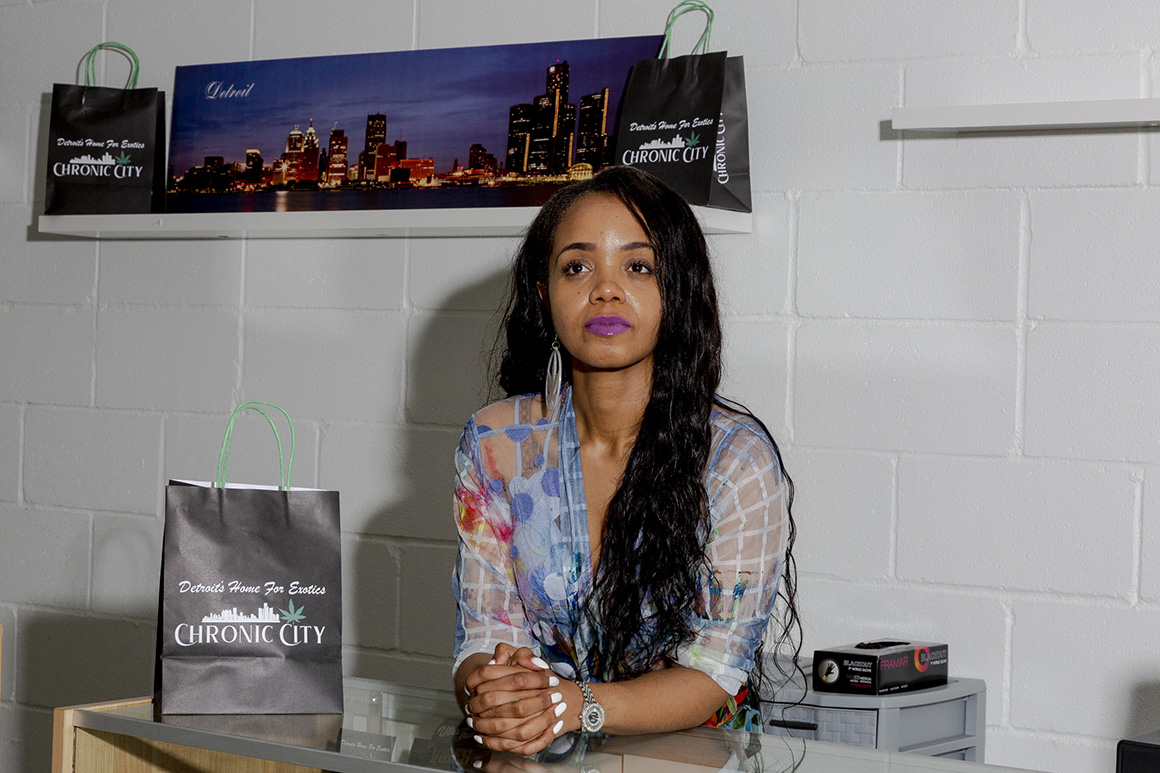
DETROIT — In February 2021, after four years of planning and saving, Kimberly Scott realized her dream of running a marijuana dispensary. She sunk her life savings into rehabbing a storefront in a scruffy neighborhood marked by shuttered warehouses and potholed streets. She didn’t know it, but the clock was ticking from the moment she first opened her doors.
“It was full of blight. It was an empty shell in here,” Scott recalled as we sat recently at a table inside Chronic City, her medical marijuana shop. “Everything I’ve spent is in this building.”
Scott saw the business as more than just a place to buy weed. She envisioned it as striking a blow against the decades-long War on Drugs that treated cannabis as a societal scourge and disproportionately targeted Black people like her. “I know that this plant, which has been demonized, is a powerful plant,” Scott, wearing a pair of giant cannabis leaf earrings, said. “A lot of families have been separated, and just traumatized, off of a plant that is now legal.”
At the time, Scott hoped to be able to quickly transition into the much larger and potentially more profitable recreational market, which Michigan voters had approved back in 2018. She was banking on rules Detroit had passed that would place native Detroiters like Scott at the front of the line for licenses to sell to anyone over 21. But weeks passed — and then months — and the license never came. Unable to sell to anyone who lacked a medical card, Scott told me she would routinely turn away customers — as many as 20 per day — directing them to the recreational shops just a few miles away in Hamtramck, a city of 28,000 where four recreational pot shops have opened in the past two years.
“There were days I didn’t make any money in this place,” Scott told me. “That’s unheard of for selling weed.”
Six months and a couple of break-ins later, Scott locked the front door for good.
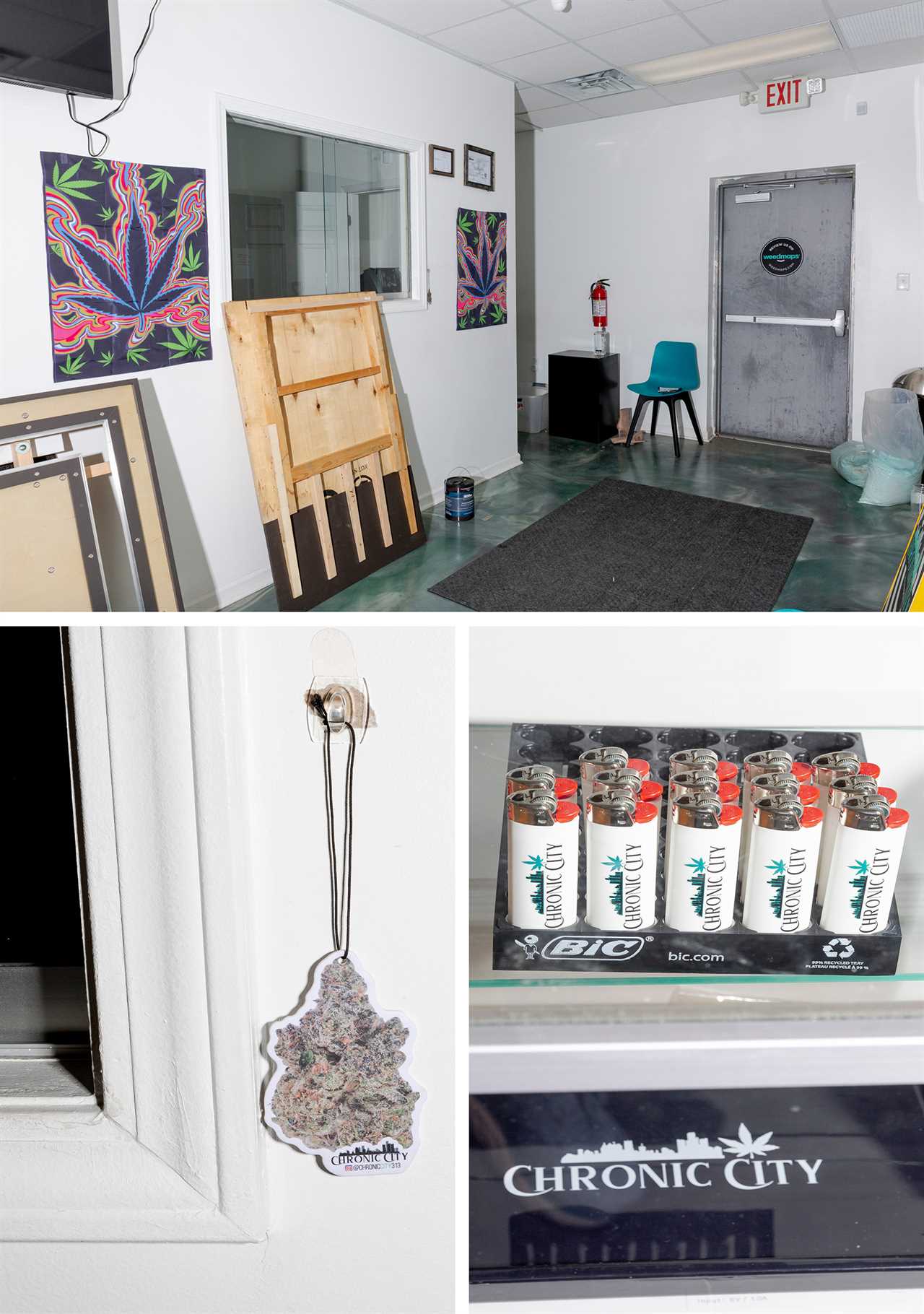
Scott is far from alone among Detroit’s medical marijuana entrepreneurs in concluding that it’s impossible to run a viable business when the competition — whether the four recreational marijuana shops in Hamtramck, or the dozens of dispensaries in the surrounding suburbs, or the numerous weed delivery services targeting Motor City residents — doesn’t have the same constraints on who they can sell to. Today, there are officially 63 licensed medical marijuana dispensaries in Michigan’s largest city, and none of them sell recreational marijuana. Meanwhile, the statewide market — at least for recreational marijuana — continues to expand. In May, medical sales statewide totaled $23 million, while recreational revenues were $163 million — a 56 percent increase from just a year earlier.
“In this industry, everyone thinks that you’re rich and you make a million dollars,” Scott said. “Maybe in other cities, but in Detroit, this is not true.”
The lack of recreational weed shops in Michigan’s largest city is not exactly by choice. But it wasn’t by accident either. For more than two years, city officials have attempted to launch an adult-use market. But their efforts to ensure that the fledgling industry reflects the city’s demographics by giving preferential treatment to long-time residents or people living in areas disproportionately targeted by criminal enforcement have led to numerous lawsuits and endless delays. The result is a still-born market where everyone is failing.
“Detroit is doing all the wrong things for all the right reasons,” said Michael DiLaura, chief corporate officer for House of Dank, a Michigan chain which has four medical shops in Detroit and is currently suing the city over its adult-use ordinance. “We’re getting killed out there in the city. There are no patients out there anymore.”
But Detroit City Council President Pro Tem James Tate, who has led the effort to establish a recreational weed market in the city, is undeterred by the setbacks and remains committed to using the city’s licensing power to remedy a racial imbalance that has existed since medical marijuana was first approved in 2018. According to the Black Cannabis Licensed Business Owners Association of Detroit, of the city’s more than 60 licensed dispensaries, just 10 are Black-owned, and some of those like Chronic City are no longer in business. He doesn’t believe entrepreneurs would be better off if the city simply got out of the way and let the market sort out winners and losers.
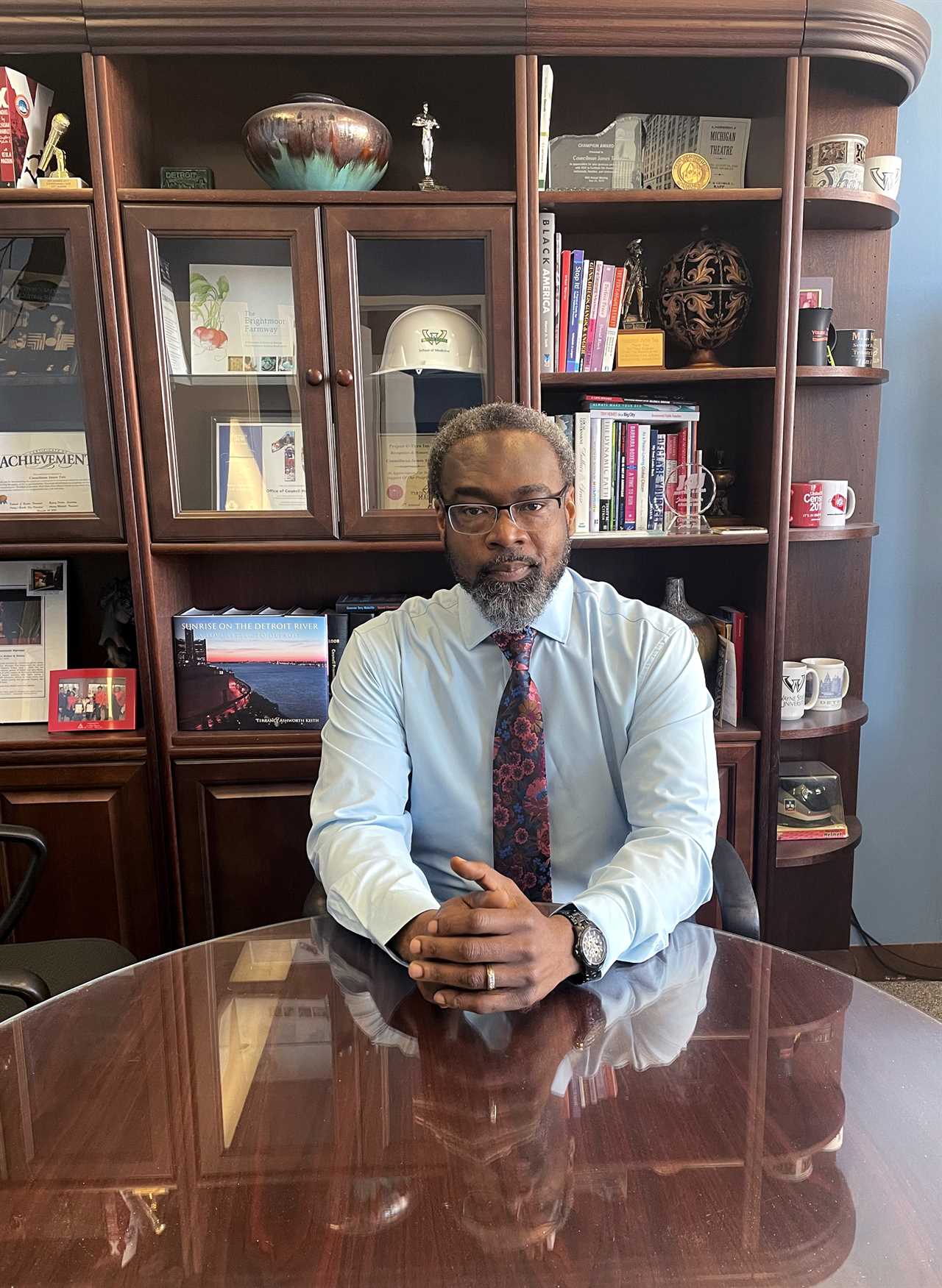
“If you don’t act on the front end in terms of trying to identify how to provide access for Detroiters, it won’t happen naturally,” Tate told me during an interview in his city council office on the 13th floor of the Coleman A. Young Municipal Center, noting the challenges local entrepreneurs faces in accessing enough capital to compete against larger businesses with deep pockets. “It’s even more difficult after licensing begins.”
Detroit is an extreme example of the types of fights that have played out over and over again as marijuana legalization has spread rapidly across the country, with 19 states now embracing legal consumption for anyone at least 21 years old and 39 states authorizing medical markets. States and cities have often established programs to try and ensure that people who were disproportionately targeted by criminal enforcement — particularly Black Americans — are able to reap the financial benefits of legalization. But those efforts have largely failed, in part because courts have struck down the preferential licensing ordinances.
“Unfortunately, what's happening in Detroit is something that is happening across the country,” Amber Littlejohn, executive director of the Minority Cannabis Business Association, told me. “What we’re seeing largely are programs that are rolled out to look and feel like equity. But when it comes to withstanding constitutional challenges, or being able to actually stand up and facilitate a diverse market, they struggle.”
In December 2019, when adult-use sales launched in Michigan, the enthusiasm for the market was immediately clear. In Ann Arbor, long a weed-friendly oasis in the state, hundreds of excited shoppers from as far away as New York and Pennsylvania waited for hours in the rain and cold to purchase products at three shops.
That wasn’t the case in Detroit.
Despite overwhelming support for the new law (69 percent of Detroit voters had approved the referendum in November 2018), city officials opted initially to prohibit non-medical sales. They said they wanted to act deliberately and not simply flip the switch and allow the city’s dozens of medical shops to transition to recreational and dominate the market. Instead, they wanted to craft an ordinance that would prioritize business opportunities for the city’s residents.
“We will not be pressured, we will not be intimidated — we will do what is necessary to achieve this particular goal,” Tate said in early 2020 after the city council voted to extend its prohibition.
Detroit was far from alone in initially blocking recreational sales. As of January 2021, more than 1,400 municipalities across the state had opted to prohibit adult-use businesses, but the overwhelming majority of those were tiny towns with little prospect for becoming major marijuana markets. In fact, most of Michigan’s other major cities — including Grand Rapids and the capital, Lansing — immediately embraced recreational sales.
By the time the Detroit City Council got around to passing an ordinance to establish an adult-use market in November 2020, nearly a year after the law had gone into effect and a full two years after the referendum had passed, the recreational market statewide had hit monthly sales of $54.7 million, surpassing medical market revenues of $37.3 million. At that time, there were 463 licensed adult-use businesses statewide, including nearly 200 dispensaries.
Detroit might have been late arriving, but officials were proud of their new law. Detroit Mayor Mike Duggan and Tate touted it as “landmark legislation” that established preferential treatment for what it called “Detroit legacy” applicants. That was designed to rectify the perceived shortcomings of the medical market; at the time, fewer than 10 percent of licenses were held by Detroiters, the rest were entrepreneurs from out of town or out of state.
Under the new ordinance, at least half of the 75 licenses for dispensaries and 35 licenses for consumption lounges would be reserved for applicants who met the “legacy” criteria. To qualify, applicants must either have lived in Detroit for at least 15 of the last 30 years, resided in the city for at least 13 of the last 30 years and have an income below the federal poverty threshold, or lived in the city for at least 10 years out of the last 30 and have drug conviction. The City Council passed the ordinance unanimously.
“We vetted various scenarios to provide some type of assistance that would allow for true ownership and opportunity for Detroiters,” Tate told me at the time. “We were very, very, very rigorous in our approach.”
But almost immediately, there were complaints that the city was unfairly putting its thumb on the scale and arbitrarily boxing out otherwise qualified applicants.
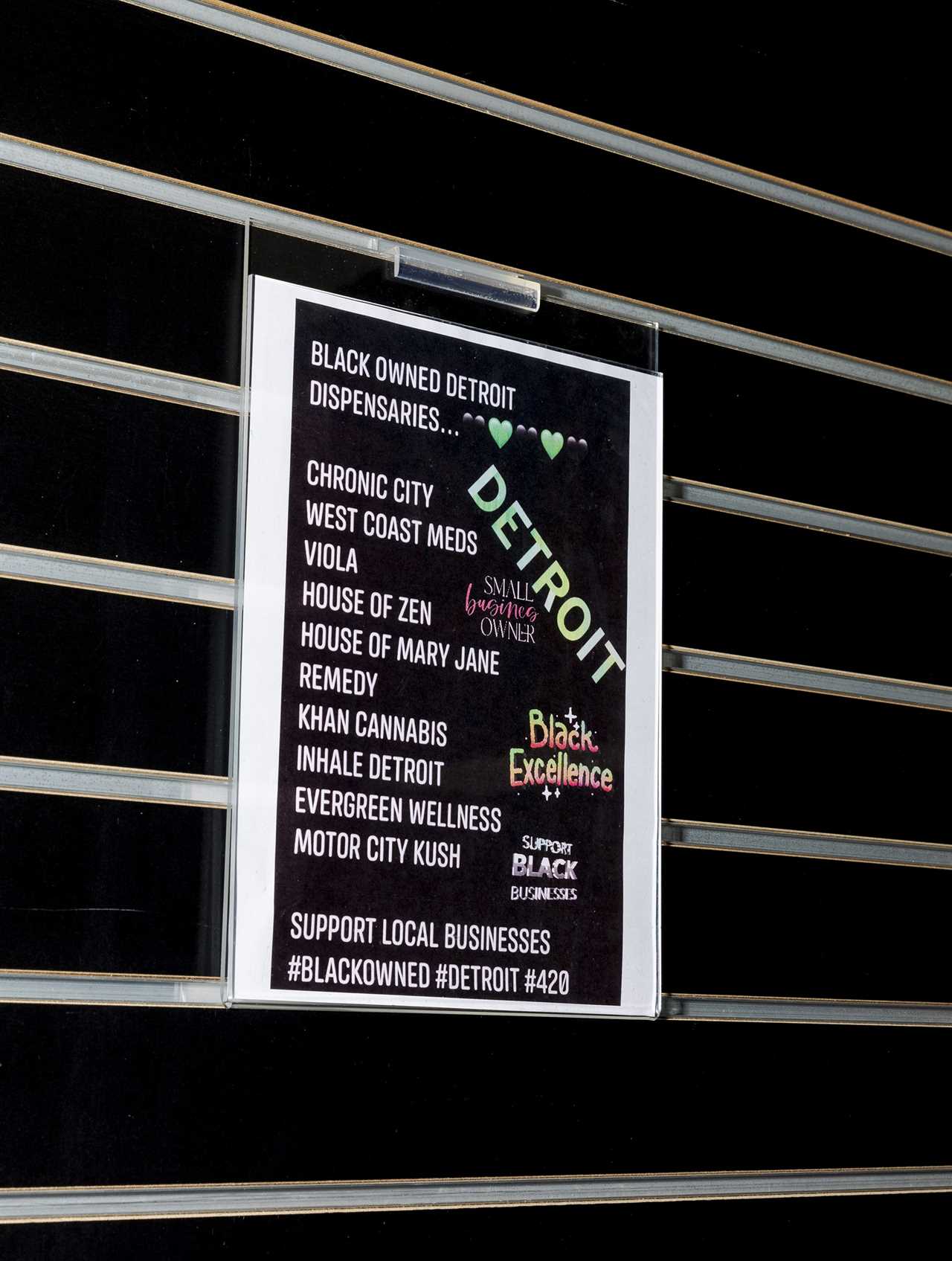
In March 2021, Crystal Lowe filed a lawsuit, arguing that she would almost certainly be denied a license to operate a dispensary even though she had lived in Detroit for 11 of the last 30 years, narrowly missing out on the legacy designation. Lowe argued the ordinance violated state and federal constitutions.
In June 2021, a federal judge sided with Lowe. The program “gives an unfair, irrational, and likely unconstitutional advantage to long-term Detroit residents over all other applicants,” wrote U.S. District Court Judge Bernard Friedman in his ruling. He issued a preliminary injunction blocking the city from proceeding with the application process. That left the 20 pending applications in legal limbo.
City attorneys didn’t admit any wrongdoing, but Tate and his colleagues on the council went back to the drawing board.
In April, the city council passed a revised ordinance, this time by an 8-1 margin, designed to eliminate the legal flaws outlined in the court ruling. (The lone dissenter, Councilmember Mary Waters, argued that it didn’t go far enough to ensure that longtime Detroit residents are able to take advantage of business opportunities. “The (ordinance) created a licensing system that opens our city up to exploitation from out-state big-business interests,” Waters said in a statement.)
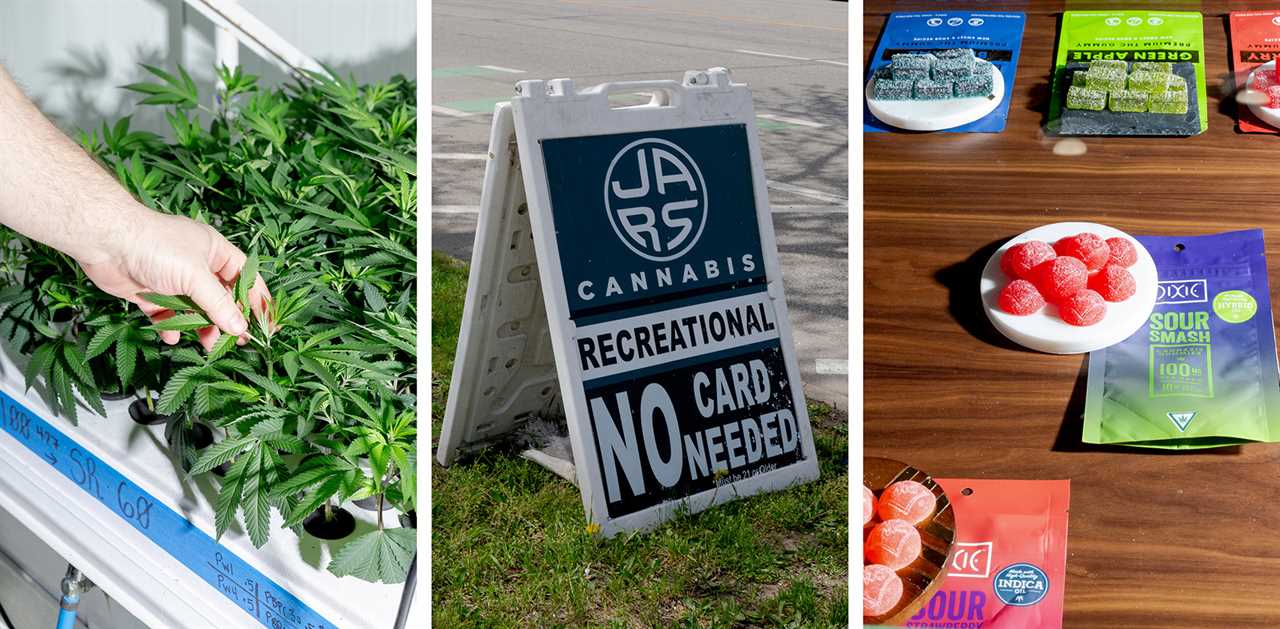
The biggest change in the new ordinance: It reserved dispensary and consumption lounge licenses for “equity” applicants, rather than “legacy” applicants. Equity applicants were defined as individuals residing in a community with a higher rate of marijuana arrests than Michigan’s median and where at least 20 percent of the population have incomes below the federal poverty threshold. But critics said the change merely amounted to using different terminology to establish a similarly discriminatory licensing structure.
Once again, almost immediately, the city got sued. This time, however, the plaintiff wasn’t a single woman claiming discrimination.
In May, House of Dank and three other businesses filed a lawsuit in state court arguing that they’re being unfairly frozen out of the city’s fledgling recreational market until at least January 2027. That’s the date when the ordinance allows dispensaries to convert their medical licenses to adult-use licenses. They argued that the new ordinance violates state law and will lead to the “financial ruin” of their businesses. A second lawsuit filed earlier this month in state court by two other cannabis companies argued that the ordinance’s “unreasonably impracticable” rules violate state law and would impose a “death sentence” on their businesses. They’re asking the court to block Detroit from implementing the ordinance.
(In April, the city began accepting applications for some categories of adult-use licenses such as grow operations, and so far has received 33 applications. But it hasn’t yet started accepting applications for dispensary and consumption lounge licenses.)
“Given the clear and obvious issues with this ordinance and the previous one, you have to wonder whether city council even wants recreational dispensaries,” said Scott Roberts, one of the attorneys representing the plaintiffs in the second case.
Denise Pollicella, a cannabis attorney who has been involved in litigation challenging ordinances throughout Michigan but who isn’t involved in any of the current lawsuits targeting Detroit, said cities have two clear pathways to avoid getting sued. They can either allow unlimited licensing with strict zoning rules (for example, limiting marijuana businesses to a certain section of the city, or prohibiting them from operating within 1,000 feet of a school). Or they can allow only those businesses that have obtained medical licenses to apply for recreational licenses.
“It makes me sad that that the city is doing something they know will prevent recreational adult use facilities from opening simply because they don’t want the medical marijuana facility owners to have them,” Pollicella said. “It’s ridiculous. Detroit is a very large city. Nobody has ever prevented Detroit residents from getting permits.”
Tate remains committed to the approach Detroit has taken, despite the repeated legal setbacks. He argues that it’s more important to create a market that benefits longtime Detroit residents than to get it up and running quickly.
“There’s always those who want to create roadblocks,” Tate said. “It’s one thing to put together an ordinance, just to check the box and say that we’ve got one. It’s another thing to really look back and say we fought as hard as we could for the residents that we serve.”
But in the meantime, Detroit’s medical marijuana entrepreneurs — the very people Tate said he is trying to help — are slowly going out of business.
Jay Snipes and her husband Mark opened West Coast Meds on the city’s West Side at the end of October. Sales were sluggish from the outset and have eroded steadily since. They knew it would be challenging to create a viable business but figured it would give them a toehold and eventually allow them to transition to the recreational market. It took them several years just to find a location that fit the city’s zoning rules and check the other boxes necessary to get a medical license.
On a recent weekday, I visited the Snipes’ brightly lit shop, stocked with flower, wax, resin and other cannabis products. For nearly an hour, as we discussed the business’ travails, not a single customer walked through the door. Snipes, a 41-year-old Black woman wearing a green polo shirt emblazoned with the dispensary’s logo, told me they get about 20 customers per day currently, and that they’d need to do 10 times that volume to be financially viable. Every day, she said, they get calls from people asking if they’re selling to recreational customers, and they have to turn them away.
“We’re actually debating closing our doors at this point,” said Snipes. “I’ve never seen it this bad.”
But West Coast Meds isn’t among the medical shops that have sued Detroit, and Snipes said they have no intention of taking legal action. Like Kimberly Scott, she blames the long delay in establishing a recreational market on “greed” from the medical businesses that are suing the city, rather than on city officials for creating an improper licensing structure.
“Right now, all of the dispensaries in Detroit [are] suffering. To put out a lawsuit, it’s just going to make it worse,” she said of the delay in getting the adult-use market up and running. “It’s not perfect, but it’s something to get us started, to stop the bleeding basically.”
Even under ideal conditions, the marijuana industry presents formidable challenges for entrepreneurs.
The legal market is booming — national sales are expected to hit $32 billion this year, more than doubling since 2019, according to New Frontier Data — as more and more states authorize medical or recreational sales. But federal illegality creates massive hurdles for businesses. That includes sky-high taxes because they’re treated like illegal narcotics traffickers and can’t write off business expenses like salaries and benefits. In addition, marijuana companies are cut off from most traditional sources of capital, since banks largely aren’t willing to do business with them. And then there’s the challenge of competing against illegal sellers — who remain a big share of the market in many states, and don’t have to worry about paying taxes or licensing fees.
The bottom line: Most of the biggest weed chains in the country are still losing money.
But most industry observers believe it’s only a matter of time before federal marijuana restrictions are loosened, barriers to profitability are removed and lots of money is made from legal weed sales. That’s why Detroit and other cities and states are taking steps now to try and address equity in the fledgling markets.
Like a lot of large cities, racial disparities in how drug crime has been enforced and prosecuted over the years has devastated Detroit’s Black community. Black people are almost four times as likely as white people to be arrested for marijuana possession nationwide, even though both groups use the drug at roughly equal rates, according to a study by the ACLU initially released in 2013. Seven years later, the ACLU updated the study and found that the racial disparities remained just as stark. In some states, the chasm between white and Black arrests are even more extreme: In Illinois, for example, Black people were arrested for marijuana possession at more than seven times the rate of their white counterparts.
That has led to a variety of criminal justice reforms — most notably programs to scrap old marijuana convictions, which have led to tens of thousands of people removing the stigma of criminality from their records and potentially easing barriers to employment, housing and other crucial services. But efforts to redress the harms of discriminatory enforcement by engineering the commercial sector — no matter how well intentioned — have so far largely failed.
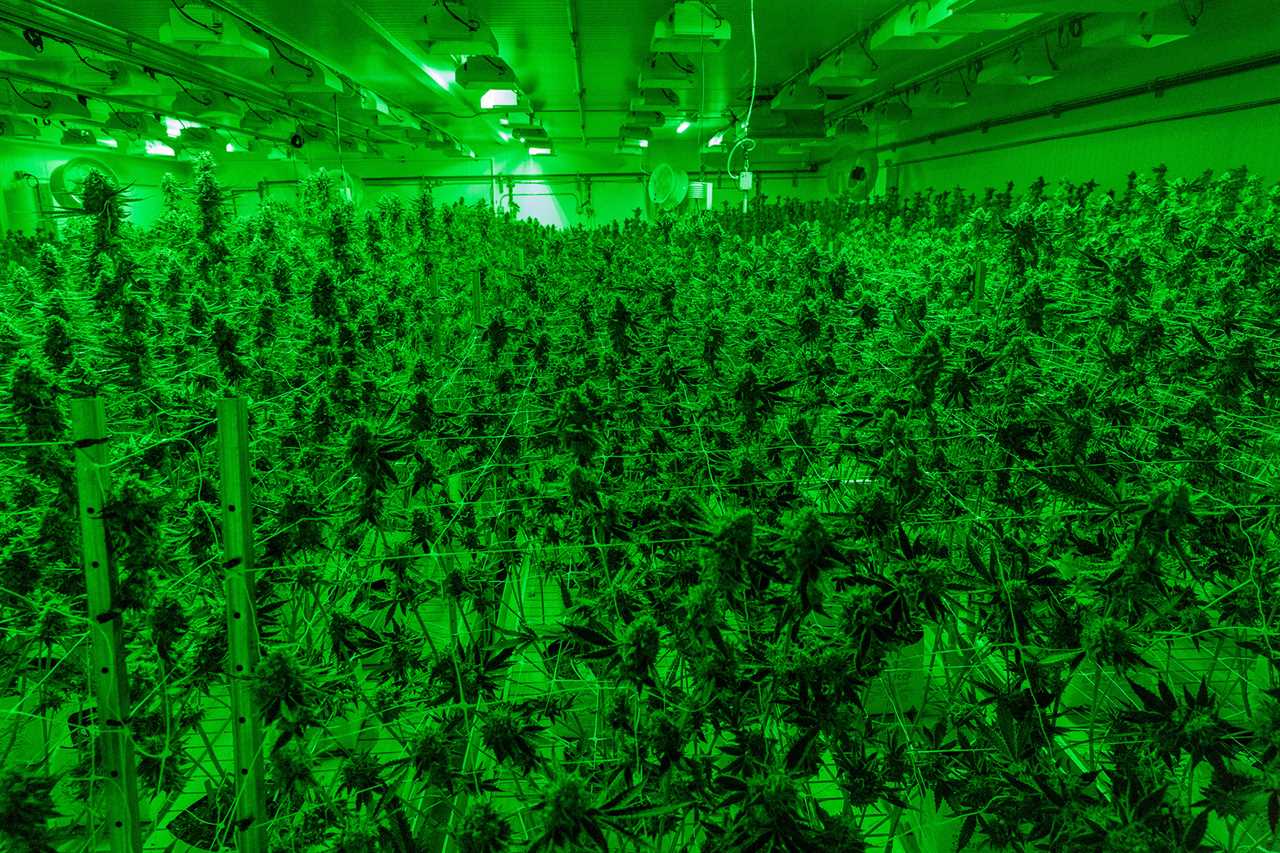
Illinois is arguably the most glaring example. When the Legislature legalized marijuana possession for anyone at least 21 years old in 2019, it was hailed as the most aggressive effort in the country to ensure that the market would benefit people in communities disproportionately targeted by law enforcement. But in the ensuing years, the program has been beset by lawsuits that ground the licensing process to a halt, frustrating local weed entrepreneurs and state officials. Unlike in Detroit, Illinois’ existing medical dispensaries — largely owned by big multi-state operators — were permitted under the state’s recreational law to start selling immediately to anyone at least 21 years old, giving them a stranglehold in a market that had $1.4 billion in sales last year. Illinois has gone from being seen as a potential national model to serving as a cautionary tale for other states.
Shaleen Title, a former member of the Massachusetts Cannabis Control Commission who has written extensively about efforts to create equity in the cannabis industry, says one of the biggest mistakes states and cities have made is allowing medical operators to immediately move into the recreational market before licensing programs designed to create equity in the industry are launched. For that reason, she says it’s too soon to evaluate whether Detroit’s approach — despite two years of setbacks — will ultimately prove successful.
“I don’t think success is measured by how quickly a program starts,” Title said. “I think the most efficient program is probably an unfair and thoughtless one. It really depends on how this time is being used, and what the local market in Detroit actually ends up looking like.”
But both Title and Littlejohn, of the Minority Cannabis Business Association, see the limited license approach taken by Detroit — there will initially be just 100 adult-use dispensary licenses and 35 consumption lounge licenses available — as less than ideal.
Littlejohn says that markets like California and Oklahoma that have unlimited business licenses have had greater success in creating racially diverse markets than their counterparts in most other states, where there are typically strict limits.
“These more liberal models are yielding more diverse cannabis businesses,” she said.
Title points to Massachusetts as a model that’s starting to show some results. In that state there are no limits on the total number of licenses, only on how many licenses any one individual or business can hold.
“The best possible program would have low barriers to entry and be accessible,” Title said, “and then on top of it, it would have special benefits for people harmed by the Drug War. That’d be the perfect scenario.”
The free market of weed looks a lot like Holbrook Avenue.
Just over the Detroit city line, past a sign that reads “Hamtramck Welcomes You,” is a two-story building emblazoned with a black and white abstract mural from the ground to the roof that at one time housed the Polish Veterans Club. On Halloween weekend in 2020, Pleasantrees opened for business in this building, becoming the first recreational weed shop in Hamtramck.
That development sparked an outcry in the small city, which is entirely surrounded by Detroit. While Hamtramck historically was renowned as an enclave for Polish Americans — as well as for its hulking General Motors assembly plant — in more recent years, the population has been transformed by immigrants from Yemen and Bangladesh.
Hamtramck’s majority Muslim city council was outraged to discover that a weed shop had popped up in Hamtramck. Under Michigan state law, municipalities have to opt out if they don’t want recreational marijuana businesses operating within their borders. Since Hamtramck had failed to do so, the council members had few options for shutting Pleasantrees down without spurring a lawsuit that they would almost certainly lose.
Eventually, four dispensaries opened their doors in Hamtramck, and the initial uproar over their presence has largely died down.
“It is what it is,” Benjamin Sobczak, chief legal officer for Pleasantrees, which operates five dispensaries in Michigan and two in Massachusetts, told me on a recent weekday afternoon. “Half the people are happy. Half the people are sad. But nothing bad happened. And it’s easier than fighting more.”
Sobczak was dressed in decidedly non-lawyerly attire of jean shorts and a t-shirt emblazoned with “White Boy Rick,” an infamous Detroit resident who spent more than three decades in prison for drug offenses and now partners with Pleasantrees on a line of cannabis products.

There’s a steady stream of customers at the pristine store filled with glass showcases for Pleasantrees’ line of products. Sales were so good over the recent unofficial weed holiday of 4/20 that supplies are running low. Even so, there’s plenty to entice shoppers, ranging from the company’s “gud nuff” product line (“It’s the Miller High Life of weed,” Sobczak said) to high potency strains from cannabis company Clout King (“for the real weed smokers,” in Sobczak’s estimation).
The second floor of the building is partially occupied by Eaze, a California delivery company that added Michigan as its second state of operations in 2021. It delivers within about a 30-mile radius of Hamtramck, easily encompassing all of metro Detroit, according to Kristine Burnes, who oversees the Hamtramck operation.
Burnes can’t quantify exactly how much of Eaze’s business is Detroit deliveries, but she says it’s not a huge piece. That’s likely in part because the company tracks crime data and won’t deliver to areas that it deems too dangerous. “They geofence those territories off, so people can’t order,” Burnes said. “We can't deliver into certain neighborhoods, certain streets, certain addresses.”
Even for recreational businesses like Eaze and Pleasantrees, the weed business isn’t without significant challenges. Sobczak points out that the price of marijuana in Michigan has plummeted over the last year, squeezing already thin profit margins.
“If you cut any market pricing by 40 percent industry-wide in a year, it’s going to shake a lot of people’s cages,” he said.
Sobczak has his own family ties to Hamtramck: His Polish grandparents spent a large part of their lives in the city. He’s not alone among the Pleasantrees’ staff. A plaque in the lobby of the dispensary notes that the grandparents of the company’s chief security officer were married in the building on April 3, 1949.
But whatever sentimental reasons might have made Hamtramck an enticing locale, the real draw was its proximity to the untapped customer base in Detroit.
“Hamtramck was an opportunity, first and foremost. We vet out all opportunities, because good ones are difficult to find sometimes,” said Sobczak. “Obviously, knowing that there was an opportunity in Hamtramck when Detroit was tied up, as a business person trying to build a successful business, who wouldn’t see opportunity?”
Meanwhile, three miles away in Detroit, Kimberly Scott is still waiting for her opportunity.

Despite Scott’s frustrations at not being able to obtain a recreational license, and reluctantly shuttering her business, she still supports Detroit’s efforts to give entrepreneurs like her a leg up in the market. “The threat with opening all at once … is that some folks won’t be able to compete, and it will create an unfair market, which is what we have already,” said Scott, who is currently working as a cannabis consultant under the moniker Chronic Queen. “Everyone is not on the same playing field.”
But she acknowledges that the competition is only becoming more intense with every passing day.
“All the surrounding cities are coming online as rec,” Scott said. “Folks aren't waiting around on Detroit.”
----------------------------------------
By: Paul Demko
Title: Black Entrepreneurs Are Failing in Detroit’s Weed Market. Is the City to Blame?
Sourced From: www.politico.com/news/magazine/2022/06/17/detroit-black-marijuana-businesses-00040007
Published Date: Fri, 17 Jun 2022 03:30:00 EST
Did you miss our previous article...
https://consumernewsnetwork.com/politics-us/fifty-years-after-watergate-a-generation-of-frightened-editors






